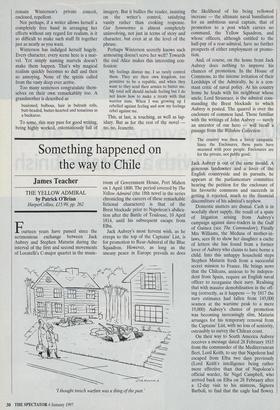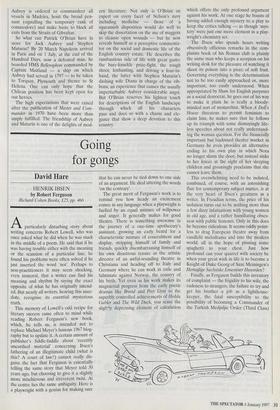Something happened on the way to Chile
James Teacher
THE YELLOW ADMIRAL by Patrick O'Brian HarperCollins, £15.99, pp. 262 Fourteen years have passed since the acrimonious exchange between Jack Aubrey and Stephen Maturin during the interval of the first and second movements of Locatelli's C-major quartet in the music 'I thought trench warfare was a thing of the past.' room of Government House, Port Mahon on 1 April 1800. The period covered by The Yellow Admiral (the 18th novel in the series chronicling the careers of these remarkable fictional characters) is that of the Brest blockade prior to Napoleon's abdica- tion after the Battle of Toulouse, 10 April 1814, until his subsequent escape from Elba.
Jack Aubrey's most fervent wish, as he creeps to the top of the Captains' List, is for promotion to Rear-Admiral of the Blue Squadron. However, as long as the uneasy peace in Europe prevails so does the likelihood of his being yellowed increase — the ultimate naval humiliation for an ambitious naval captain, that of promotion to a post which carries no command, the Yellow Squadron, and whose officers, although entitled to the half-pay of a rear-admiral, have no further prospects of either employment or promo- tion.
And, of course, on the home front Jack Aubrey does nothing to improve his chances of promotion. In the House of Commons, to the intense irritation of their Lordships of the Admiralty, he is a con- stant critic of naval policy. At his country home he feuds with his neighbour whose uncle, Lord Stranraer, is the admiral com- manding the Brest blockade to which Aubrey is posted. The quarrel is over the enclosure of common land. Those familiar with the writings of John Aubrey — surely an ancestor of our hero — will recall a passage from the Wiltshire Collection:
The country was then a lovely campania. Since the Enclosures, these parts have swarmed with poor people. Enclosures are for the private, not public good.
Jack Aubrey is out of the same mould. A generous landowner and a lover of the English countryside and its pursuits, he appears at the parliamentary committee hearing the petition for the enclosure of his favourite commons and succeeds in getting it rejected, much to the financial discomfiture of his admiral's nephew.
Domestic matters are dismal. Cash is in woefully short supply, the result of a spate of litigation arising from Aubrey's campaign against slave-traders in the Gulf of Guinea (see The Commodore). Finally Mrs Williams, the Medusa of mother-in- laws, sees fit to show her daughter a cache of letters she has found from a former lover of Aubrey who claims to have borne a child. Into this unhappy household steps Stephen Maturin fresh from a successful secret mission to France. He brings news that the Chileans, anxious to be indepen- dent from Spain, require an English naval officer to reorganise their navy. Realising that with massive demobilisation in the off- ing (correctly, as it happens — by 1817 the navy estimates had fallen from 145,000 seamen at the wartime peak to a mere 19,000) Aubrey's chance of promotion was becoming increasingly slim, Maturin arranges for his temporary removal from the Captains' List, with no loss of seniority, ostensibly to survey the Chilean coast.
On their way to South America Aubrey receives a message dated 28 February 1815 from the commander of the Mediterranean fleet, Lord Keith, to say that Napoleon had escaped from Elba two days previously (Lord Keith's intelligence being rather more effective than that of Napoleon's official warder, Sir Nigel Campbell, who arrived back on Elba on 28 February after a 12-day visit to his mistress, Signora Barboli, to find that the eagle had flown). Aubrey is ordered to commandeer all vessels in Madeira, hoist the broad pen- nant (signalling the temporary rank of commodore) and make haste to block all exits from the Straits of Gibraltar.
So what can Patrick O'Brian have in store for Jack Aubrey and Stephen Maturin? By 20 March Napoleon arrived in Paris and on 1 July, at the end of the Hundred Days, now a defeated man, he boarded HMS Bellerophon commanded by Captain Maitland — a ship on which Aubrey had served in 1797 — to be taken to Torquay, Plymouth and thence to St Helena. One can only hope that the Chilean position has been kept open for our heroes.
The high expectations that were raised after the publication of Master and Com- mander in 1970 have been more than amply fulfilled. The friendship of Aubrey and Maturin is one of the delights of mod-
ern literature. Not only is O'Brian an expert on every facet of Nelson's navy including medicine — those of a squeamish disposition would do well to skip the dissertation on the use of maggots to cleanse open wounds — but he now reveals himself as a perceptive commenta- tor on the social and domestic life of the English country estate. He describes the rumbustious side of life with great gusto: the bare-knuckle prize-fight, the rough shoot, foxhunting, and driving a four-in- hand, the latter with Stephen Maturin's dashing wife Diana in charge of the rib- bons, an experience that causes the usually imperturbable Aubrey considerable angst. But O'Brian reserves his lightest touch for descriptions of the English landscape through which all his characters pass and does so with a charm and ele- gance that show a deep devotion to this country.



























































 Previous page
Previous page